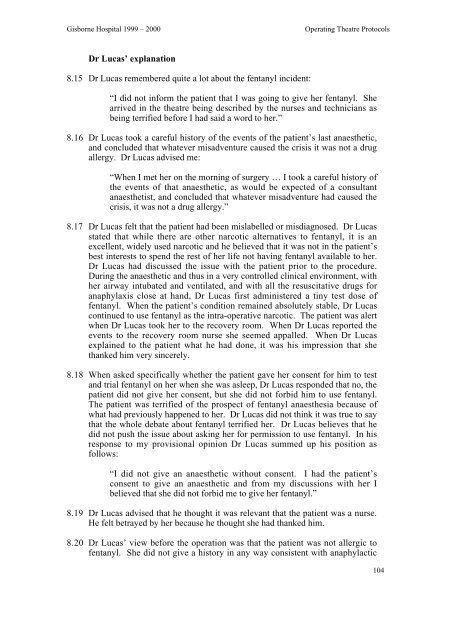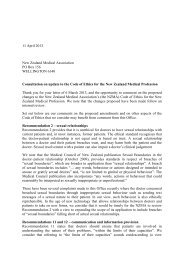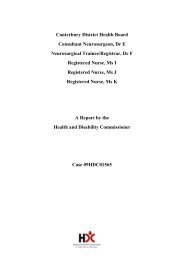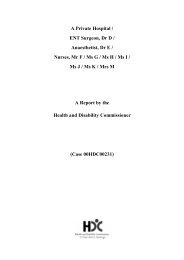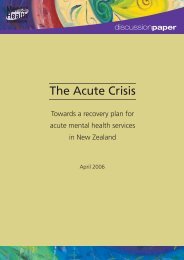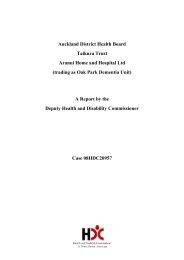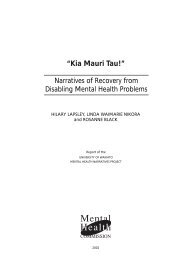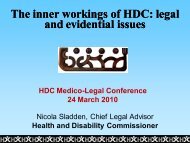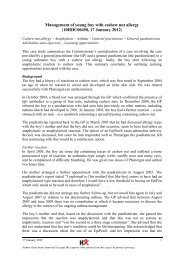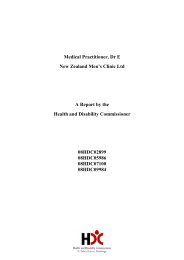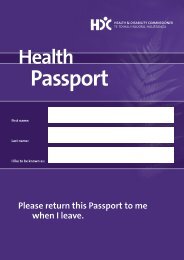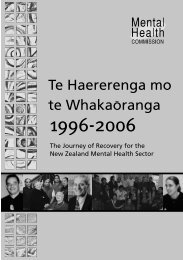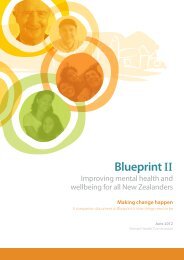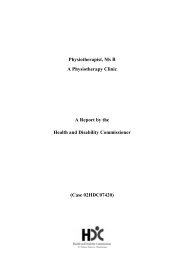Gisborne Hospital Report - Health and Disability Commissioner
Gisborne Hospital Report - Health and Disability Commissioner
Gisborne Hospital Report - Health and Disability Commissioner
You also want an ePaper? Increase the reach of your titles
YUMPU automatically turns print PDFs into web optimized ePapers that Google loves.
<strong>Gisborne</strong> <strong>Hospital</strong> 1999 – 2000<br />
Operating Theatre Protocols<br />
Dr Lucas’ explanation<br />
8.15 Dr Lucas remembered quite a lot about the fentanyl incident:<br />
“I did not inform the patient that I was going to give her fentanyl. She<br />
arrived in the theatre being described by the nurses <strong>and</strong> technicians as<br />
being terrified before I had said a word to her.”<br />
8.16 Dr Lucas took a careful history of the events of the patient’s last anaesthetic,<br />
<strong>and</strong> concluded that whatever misadventure caused the crisis it was not a drug<br />
allergy. Dr Lucas advised me:<br />
“When I met her on the morning of surgery … I took a careful history of<br />
the events of that anaesthetic, as would be expected of a consultant<br />
anaesthetist, <strong>and</strong> concluded that whatever misadventure had caused the<br />
crisis, it was not a drug allergy.”<br />
8.17 Dr Lucas felt that the patient had been mislabelled or misdiagnosed. Dr Lucas<br />
stated that while there are other narcotic alternatives to fentanyl, it is an<br />
excellent, widely used narcotic <strong>and</strong> he believed that it was not in the patient’s<br />
best interests to spend the rest of her life not having fentanyl available to her.<br />
Dr Lucas had discussed the issue with the patient prior to the procedure.<br />
During the anaesthetic <strong>and</strong> thus in a very controlled clinical environment, with<br />
her airway intubated <strong>and</strong> ventilated, <strong>and</strong> with all the resuscitative drugs for<br />
anaphylaxis close at h<strong>and</strong>, Dr Lucas first administered a tiny test dose of<br />
fentanyl. When the patient’s condition remained absolutely stable, Dr Lucas<br />
continued to use fentanyl as the intra-operative narcotic. The patient was alert<br />
when Dr Lucas took her to the recovery room. When Dr Lucas reported the<br />
events to the recovery room nurse she seemed appalled. When Dr Lucas<br />
explained to the patient what he had done, it was his impression that she<br />
thanked him very sincerely.<br />
8.18 When asked specifically whether the patient gave her consent for him to test<br />
<strong>and</strong> trial fentanyl on her when she was asleep, Dr Lucas responded that no, the<br />
patient did not give her consent, but she did not forbid him to use fentanyl.<br />
The patient was terrified of the prospect of fentanyl anaesthesia because of<br />
what had previously happened to her. Dr Lucas did not think it was true to say<br />
that the whole debate about fentanyl terrified her. Dr Lucas believes that he<br />
did not push the issue about asking her for permission to use fentanyl. In his<br />
response to my provisional opinion Dr Lucas summed up his position as<br />
follows:<br />
“I did not give an anaesthetic without consent. I had the patient’s<br />
consent to give an anaesthetic <strong>and</strong> from my discussions with her I<br />
believed that she did not forbid me to give her fentanyl.”<br />
8.19 Dr Lucas advised that he thought it was relevant that the patient was a nurse.<br />
He felt betrayed by her because he thought she had thanked him.<br />
8.20 Dr Lucas’ view before the operation was that the patient was not allergic to<br />
fentanyl. She did not give a history in any way consistent with anaphylactic<br />
104


